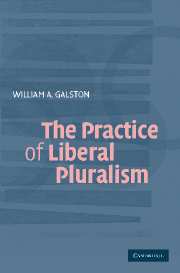Book contents
- Frontmatter
- Contents
- Acknowledgments
- 1 Introduction
- PART I PHILOSOPHICAL FOUNDATIONS OF LIBERAL PLURALISM
- PART II LIBERAL PLURALISM AND PUBLIC ACTION
- 5 Value Pluralism and Political Means: Toughness as a Political Virtue
- 6 Value Pluralism and Motivational Complexity: The Case of Cosmopolitan Altruism
- PART III POLITICS, MARKETS, AND CIVIC LIFE IN LIBERAL PLURALIST SOCIETIES
- PART IV DEFENDING LIBERAL PLURALISM
- Index
5 - Value Pluralism and Political Means: Toughness as a Political Virtue
Published online by Cambridge University Press: 18 December 2009
- Frontmatter
- Contents
- Acknowledgments
- 1 Introduction
- PART I PHILOSOPHICAL FOUNDATIONS OF LIBERAL PLURALISM
- PART II LIBERAL PLURALISM AND PUBLIC ACTION
- 5 Value Pluralism and Political Means: Toughness as a Political Virtue
- 6 Value Pluralism and Motivational Complexity: The Case of Cosmopolitan Altruism
- PART III POLITICS, MARKETS, AND CIVIC LIFE IN LIBERAL PLURALIST SOCIETIES
- PART IV DEFENDING LIBERAL PLURALISM
- Index
Summary
INTRODUCTION: VIRTUE AND POLITICAL LIFE
My topic in this chapter is political virtue: more precisely, a political virtue – a disposition of mind and character I will call “toughness.” My contention is that in spite of its well-advertised disquieting aspects, this disposition fully deserves the honorific term “virtue,” and that individuals lacking this virtue who seek to attain and exercise political leadership will bring themselves and others to grief. If true, this contention reveals a dimension of value pluralism with deep and often troubling implications for the practice of politics.
The need for toughness arises from an unpleasant but pervasive fact about politics: The attainment of even the worthiest ends will sometimes require the employment of distasteful means. While Machiavelli was by no means the first student of politics to make this observation, his relentless concentration on it has led many to regard it as his distinctive contribution to political wisdom. In deference to this common view, I will call the perplexed relation between public ends and public means “Machiavelli's problem.” This problem preoccupied – one might almost say transfixed – Max Weber. More recently, it has gained the attention of some of our most talented moral philosophers – Michael Walzer, Bernard Williams, and Thomas Nagel, along others – and I shall have occasion to discuss their views.
As Stuart Hampshire observed, we cannot dissolve Machiavelli's problem simply by rejecting the broader valuational frame of Machiavelli's politics.
- Type
- Chapter
- Information
- The Practice of Liberal Pluralism , pp. 75 - 94Publisher: Cambridge University PressPrint publication year: 2004



